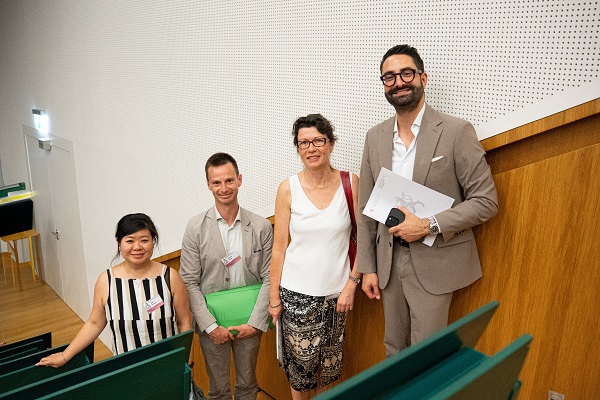 (L-R) Mei Duong, INRA Deputy Director; David Weis, INRA Director; Simone Niclou, Vice-Rector for Research at University of Luxembourg; Eric Thill, Luxembourg's Minister for Culture;
Credit: University of Luxembourg
(L-R) Mei Duong, INRA Deputy Director; David Weis, INRA Director; Simone Niclou, Vice-Rector for Research at University of Luxembourg; Eric Thill, Luxembourg's Minister for Culture;
Credit: University of Luxembourg
Luxembourg's Ministry of Culture and the National Institute of Archaeological Research (INRA) have reported that more than 150 professional archaeologists, researchers, volunteers, private sector operators and students from across the Grand Duchy and the Greater Region attended the fourth edition of the Archaeological Research Days (Journées d'Actualité de la Recherche Archéologique) on Wednesday 2 and Thursday 3 July 2025.
The event, organised by INRA in cooperation with the University of Luxembourg, took place at the university campus in Esch-Belval.
Over two days, participants presented the region's latest archaeological discoveries, shared their methodological approaches and discussed the challenges and prospects of the sector. The authorities added that this event also served to strengthen ties between the various stakeholders in archaeological heritage.
Luxembourg's Minister for Culture, Eric Thill, officially opened the event on Wednesday evening. In his speech, he praised the quality of the collaboration between INRA and the University of Luxembourg, while highlighting the significant progress made in recent years, namely: increased professionalisation, increased public resources, better promotion of major sites and the gradual structuring of an ecosystem around Luxembourg archaeology.
The minister stated: "Luxembourg archaeology has come a long way. It finally has the means for professional and scientific development commensurate with the riches of our subsoil. These conferences symbolise this new, more inclusive, more rigorous and more ambitious dynamic."
Among the reported highlights of this edition was the presentation of the results of a broad consultation conducted by INRA with stakeholders in the field. This approach aims to better identify expectations and inform the institute's future strategic directions.
The authorities noted that the Archaeological Research Days are part of a broader discussion led by the Ministry of Culture on the implementation of a national action plan for access to culture. Archaeological heritage, with its educational and identity-building potential, is set to play a key role in this.








